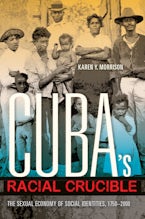- Home
- Cuba's Racial Crucible
Preparing your PDF for download...
There was a problem with your download, please contact the server administrator.
Cuba's Racial Crucible
The Sexual Economy of Social Identities, 1750-2000
Published by: Indiana University Press
372 Pages, 8 b&w illus., 1 map, 16 tables
- eBook
- 9780253016607
- Published: May 2015
$9.99
Other Retailers:
Since the 19th century, assertions of a common, racially-mixed Cuban identity based on acceptance of African descent have challenged the view of Cubans as racially white. For the past two centuries, these competing views of Cuban racial identity have remained in continuous tension, while Cuban women and men make their own racially oriented choices in family formation. Cuba's Racial Crucible explores the historical dynamics of Cuban race relations by highlighting the racially selective reproductive practices and genealogical memories associated with family formation. Karen Y. Morrison reads archival, oral-history, and literary sources to demonstrate the ideological centrality and inseparability of "race," "nation," and "family," in definitions of Cuban identity. Morrison analyzes the conditions that supported the social advance and decline of notions of white racial superiority, nationalist projections of racial hybridity, and pride in African descent.
Preface: A Crucible of Race: Historicizing the Sexual Economy of Cuban Social Identities
Acknowledgments
1. Ascendant Capitalism and White Intellectual Re-Assessments of Afro-Cuban Social Value to 1820
2. Slavery and Afro-Cuban Family Formation during Cuba's Economic Awakening, 1763–1820
3. The Illegal Slave Trade and the Cuban Sexual Economy of Race, 1820–1867
4. Nineteenth-Century Racial Myths and the Familial Corruption of Cuban Whiteness
5. Afro-Cuban Family Emancipation, 1868–1886
6. "Regenerating" the Afro-Cuban Family, 1886–1940
7. Mestizaje Literary Visions and Afro-Cuban Genealogical Memory, 1920–1958
Epilogue: Revolutionary Social Morality and the Multi-Racial National
Family, 1959–2000
Notes
References
Index
Karen Y. Morrison is Assistant Professor in the W. E. B. Du Bois Department of Afro-American Studies at the University of Massachusetts Amherst and a social historian of the African diaspora.
"Morrison's book opens up several new avenues for research on sexuality and family formation in Cuba, and she does so with a masterful grasp on colonial sources and raises critical questions for the twentieth century. While most scholars accept the primacy of race and sexuality in Cuban history, Morrison succeeds at excavating these questions on a micro-level, providing new insights into the choices and family formations forged by both enslaved and free Cubans over time.
~Cuban Studies
"
"This thought-provoking book will appeal to specialists and should be quite useful in graduate seminars dealing with race, nation, and Latin American history."
~Studies in Ethnicity and Nationalism
"What is most striking about Cuba's Racial Crucible is the manner in which it records why enslaved individuals labored to document paternity, maternity, and racial ascendency for social mobility, love, and individual stability. Those social actors are the highlight of Morrison's research."
~American Quarterly
"This rigorous yet accessible monograph covers an extensive period of Cuban history from a unique and innovative intersectional perspective. For these reasons, it would make an excellent addition to undergraduate collections in African and African American studies, Latin American studies, women's and gender studies, and history. . . . Highly recommended."
~Choice
"One of only a few works on Cuban history that critically examines the intersection of gender, race, and nation . . . [and] offers a unique perspective considering changes in race making and family formation over the long term."
~Marc McLeod, Seattle University
"Examining the historical process of family formation among Afro-Cubans as an entry point into an exploration of the sexual economy of race, Karen Morrison argues that to achieve a more complete understanding of the tensions, shifts, and turns in the public discourses of race in Cuba, we first need to trace the material human relations upon which those discourses and subsequent socio-cultural and political practices are built. The constitution of these intimate worlds is both a primary process as well as a main site for the production of racial meaning. . . . Her analysis shows that various peoples from all over the Cuban social landscape transgressed racialized boundaries in their desire to recognize and legitimize their family formations, challenged the racialized hierarchies, [and by doing so] transformed the actual meanings of the categories of race."
~Ileana M. Rodriquez-Silva, University of Washington

